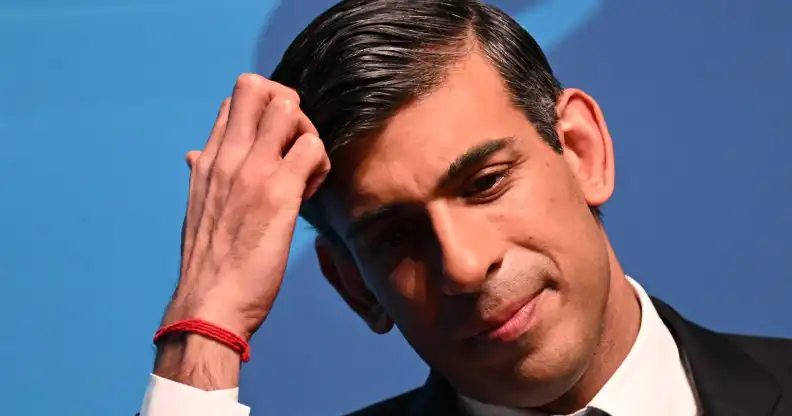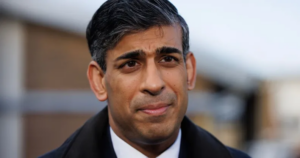
British Prime Minister Rishi Sunak has found himself mired in controversy and rapidly declining popularity following divisive comments he made during the 2023 Conservative Party Conference. A recent YouGov poll conducted for The Times newspaper has unveiled a significant drop in Sunak’s approval ratings, making it his lowest rating since he assumed office. These developments come on the back of a polarizing statement on transgender issues that has ignited outrage and condemnation from various quarters.
The YouGov survey revealed that only 20 percent of voters believed Rishi Sunak would make the best prime minister, marking a five-point drop in a week. This is a remarkable setback for the Prime Minister, who has been relatively popular since entering Downing Street. However, his controversial remarks have contributed to a decline in his standing among the electorate.
The controversy erupted when Rishi Sunak, while speaking at the Conservative Party Conference on October 4th in Manchester, expressed anti-trans sentiments, declaring, “A man is a man, and a woman is a woman, that’s just common sense.” This statement, which was met with applause from some Tory MPs and Conservative Party members in attendance, triggered a firestorm of criticism and condemnation from Members of Parliament, charities, LGBTQ+ activists, and the broader community.
Shockingly, despite the widespread backlash, Prime Minister Sunak remained steadfast in his stance, stating that he had no regrets and insisting that his misgendering of transgender individuals is “common sense.” This unwavering commitment to his divisive viewpoint only served to deepen the controversy.
The Times’ poll also showed a decline in support for the Labour leader, Keir Starmer, who saw his rating fall by two points to 32 percent. However, 28 percent of voters believed that Starmer had a clear plan for the country, up by six points from the previous week. In contrast, only 19 percent of voters thought that Rishi Sunak had a clear plan, a drop of two points from the previous week.
The poll revealed a lack of confidence in Sunak’s plans, with only 25 percent of respondents believing that his policies would bring about significant change. On the other hand, 47 percent of respondents felt that a Labour government would usher in substantial change, with 37 percent disagreeing.
When asked about which party they trusted to handle the economy, 31 percent of respondents favored Labour, while 25 percent favored the Conservatives. A significant portion, 39 percent, remained unsure.
In addition to Sunak’s plummeting popularity, the Labour Party has also increased its overall lead in the polls over the Tories by two points. This could be indicative of a growing sense among the electorate that the Labour Party is better positioned to address the country’s challenges.
The Labour Party, during its conference held in Liverpool, promised to “deliver where the Conservatives have failed.” At the National Women’s Conference on October 7th, the shadow women and equalities secretary, Anneliese Dodds, committed to a “no loopholes” trans-inclusive ban on conversion therapy if Labour wins the next general election. This promise comes in response to concerns that Rishi Sunak may delay or shelve the long-awaited conversion therapy ban, citing concerns about similar laws in other countries.
In summary, Rishi Sunak’s popularity has taken a significant hit following his controversial remarks on transgender issues. The fallout from this controversy has raised questions about his leadership and has given the Labour Party an edge in the polls. As the political landscape continues to evolve, it remains to be seen how these developments will shape the future of British politics.
Author























